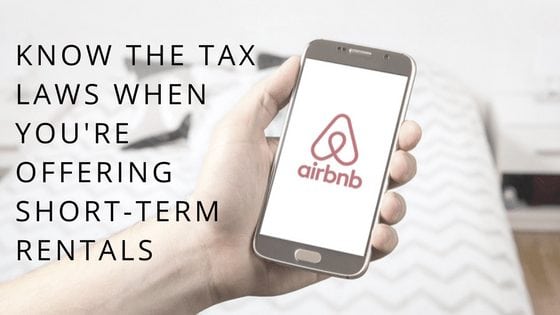Updated October 2, 2021
The popularity of online rental marketplaces like Airbnb has exploded, providing a previously unavailable income opportunity for people. By blurring the lines between personal and business space, Airbnb ‘landlords’ could end up dealing with the IRS.
Notice: If you own a business, you will need to become compliant with the US Corporate Transparency Act
Learn how you need to protect yourself as a short-term rental landlord.
Renting out your home through a service like Airbnb, as a short-term rental landlord, can certainly bring in extra money but, as with everything else, that income is subject to IRS scrutiny. Now, in most cases, taxes in these situations are assessed via filing an IRS Form 1099-MISC. However, because of Section 280A and its governance over the usage of one’s home for business purposes, there is a mix of definitions and conditions that need consideration. Here are some of the major conditions to be aware of and their tax consequences:
Short Term Rentals (Less Than 14 Days Over Course of Year)
If you rent out part or your entire home/apartment for under fourteen days during the whole year, then according to the rules, the income you receive during that time is considered tax-free. That’s right; it is viewed as tax-free no matter how large the collected rent amount, as long as you meet these two specific requirements. First, you only rent out your home for 14 days or less. Second, the house is also used personally by you for a period greater than 14 days over the course of the year.
If you are only renting out a spare bedroom, for instance, while living in the rest of the home then the personal use mandate is easily met. Where this can become tricky though is if you are renting out your entire home to someone wherein you are then not occupying it at all. In this case, keeping track of exactly how many days it is rented out becomes critical.
This 14-Day Rule is especially helpful if you ever want to rent out your home to your corporation for the purpose of conducting business. For example, it’s always smart to hold monthly director meetings. In that case, all you would have to do is call up local hotels in your area to figure out how much they’d charge for a one-day meeting room rental. Then you make the corporation an equivalent offer. e.g. the local hotel rate is $900, so you offer to rent for $800 instead.
You can charge a rental fee for that specific meeting that’s less than a regular hotel but still comparable enough to not violate tax law. If you do one director meeting per month, that’s 12 days a year your residence has been rented out for explicit business purposes and you get to keep all that money tax-free. In this example, that’s an extra $9600 you can have tax-free to yourself. For your corporation, the rental payments can be deducted too so everyone involved wins.
Long Term Rentals (More Than 14 Days Over Course of Year) –
Once you pass the 14-day rental mark though and live in your home for 15 days or more, the previously-mentioned exemption no longer applies. At that point, you will need to report your rental income to the IRS for taxation. To properly report it, you need to fill out a Schedule E and file that along with your tax return. There is a silver lining here though; while you are required to report the income, you are also allowed to take rental expense-related deductions within specific limits. Once those deductions are declared, you are then only taxed on the remaining profit.
However, limits are in place so as not to let people try to mix in personal expenses with the allowed rental costs. According to the rules laid out in Section 280A, you are allowed to deduct 100 percent of ‘direct rental expenses.’ These expenditures are defined as those solely related to renting itself, such as rental insurance, cleaning costs, credit checks, rental agency fees, advertising costs, and depreciation (only relating to the portion of your home used for rental). Beyond the direct rental expenses, you can also deduct a portion of the general costs to own and maintain your home, in direct correlation with the amount of the year it acts as a rental versus personal usage.
For example, let’s say that you own a home and rent it out for 90 days, and live in it the remaining 275 days of the year. When it comes to taking the deduction, you would be allowed to deduct 25 percent of your general expenses up to the rental income earned over the year. However, if you only rent out a bedroom for instance versus the entire home, then that will reduce the deduction size further in proportion to the entire home, according to Section 280A.
At the end of the day, keeping abreast of the various tax codes and how to take advantage of them without getting into trouble is important if you are renting out your property – even if it is through a service like Airbnb. Thankfully, Anderson has its team of tax professionals and lawyers who are well-versed in real estate-related tax issues. They can help make sure you are staying in compliance and point out deductions you may not be aware of taking otherwise.
As a short-term rental landlord, it’s important that you understand what action steps you can take to ensure your protection against theft, lawsuits, and maintaining privacy.
Get access to our FREE Video Series: The 8 Biggest Concerns About Airbnb Short Term Property Rentals. Click here: https://andersonadvisors.com/free-short-term-rental-video-series/
Editor’s note: This post was originally published in December 2016 and has been updated for accuracy and comprehensiveness.
Bonus Video
Free Strategy Session with an Anderson Tax Advisor
Tax Attorneys, CPAs & EAs who specialize in working with businesses and investors. Speak with an Anderson Professional Advisor to get your FREE Tax Plan Strategy Session. Limited-Time offer: FREE (a $750 value.)












